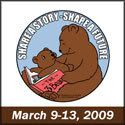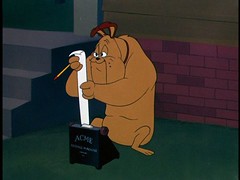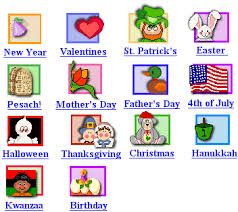 A great blog tour by and for librarians, teachers, parents and people passionate about literacy will be happening March 9-13. Called Share a Story-Shape a Future, A Blog Tour for Literacy, the weeklong event should give everyone a chance to celebrate reading and reflect on some interesting thoughts on raising readers, selecting great reading materials, using libraries, technology and reading and reading aloud. For the full scoop, visit the Share a Story-Shape a Future blog!
A great blog tour by and for librarians, teachers, parents and people passionate about literacy will be happening March 9-13. Called Share a Story-Shape a Future, A Blog Tour for Literacy, the weeklong event should give everyone a chance to celebrate reading and reflect on some interesting thoughts on raising readers, selecting great reading materials, using libraries, technology and reading and reading aloud. For the full scoop, visit the Share a Story-Shape a Future blog!
2.27.2009
Share a Story -Shape a Future
 A great blog tour by and for librarians, teachers, parents and people passionate about literacy will be happening March 9-13. Called Share a Story-Shape a Future, A Blog Tour for Literacy, the weeklong event should give everyone a chance to celebrate reading and reflect on some interesting thoughts on raising readers, selecting great reading materials, using libraries, technology and reading and reading aloud. For the full scoop, visit the Share a Story-Shape a Future blog!
A great blog tour by and for librarians, teachers, parents and people passionate about literacy will be happening March 9-13. Called Share a Story-Shape a Future, A Blog Tour for Literacy, the weeklong event should give everyone a chance to celebrate reading and reflect on some interesting thoughts on raising readers, selecting great reading materials, using libraries, technology and reading and reading aloud. For the full scoop, visit the Share a Story-Shape a Future blog!
2.25.2009
Libraries Will Get You Though Times of No Money...
 Motherreader has a great shout-out to libraries that includes one of my favorite lovably nerdy library songs. As I read her post I am reminded of the quote "Libraries will get you through times of no money better than money will get you through times of no libraries." We are really facing the reality of this as the economy spirals and our communities reel under layoffs, cutbacks and downsizing. I am glad we are here as people re-discover us!
Motherreader has a great shout-out to libraries that includes one of my favorite lovably nerdy library songs. As I read her post I am reminded of the quote "Libraries will get you through times of no money better than money will get you through times of no libraries." We are really facing the reality of this as the economy spirals and our communities reel under layoffs, cutbacks and downsizing. I am glad we are here as people re-discover us!
No Sweat SLP Ideas
 I am definitely someone who likes to work "smarter, not harder" in the summer. I don't get too frantic about the programs that we are planning. I just like to think about the possibilities for fun and getting kids together in the library and ZING! off we go. I like to plan the 2 months of summer like I plan any two months of the year: give me about a two-three month lead and we're good to go.
I am definitely someone who likes to work "smarter, not harder" in the summer. I don't get too frantic about the programs that we are planning. I just like to think about the possibilities for fun and getting kids together in the library and ZING! off we go. I like to plan the 2 months of summer like I plan any two months of the year: give me about a two-three month lead and we're good to go.Of course this is all helped along by the fact the libraries I work in have participated in the Collaborative Library Summer Program (CLSP) - a grassroots consortium of forty-seven states "working together to provide high-quality summer reading program for children at the lowest cost possible for their public libraries." We can take advantage of great materials, great ideas, great booklists...well, great everything and save a ton of time. And with so many people across the country contributing and thinking, the sky is the limit on wonderful ideas.
And of course, beyond the manual, there are even more resources! My bible of the moment comes from Michele Farley, Indiana State Library Children's Services Consultant. She created a nifty little compendium, 101 Ideas for Getting Creative and Expressing Yourself @ Your Library at WebJunction that is chock full of great ideas for amazing programs that anyone can put together - presto! Many are simple, all are fun and the cost for most is low, low, low. And perhaps the best part of this list - the ideas are so great you can use them year-round to spark your creativity and freshen up your programs. Cool!
2.24.2009
What Are We Doing Here?
 Whenever we start a new job - no matter how much experience we had previously - there is a "getting-to-know-you" period where you introduce yourself to colleagues both in your library and in organizations throughout your new community. As I work my 100th day here in my new job, I am feet-first in the midst of that particular dive and it has helped me reflect on just what it is we are doing in public library children's work.
Whenever we start a new job - no matter how much experience we had previously - there is a "getting-to-know-you" period where you introduce yourself to colleagues both in your library and in organizations throughout your new community. As I work my 100th day here in my new job, I am feet-first in the midst of that particular dive and it has helped me reflect on just what it is we are doing in public library children's work. The other day I sat down with an elementary school principal and she asked, "What is your vision of what you hope to do?". Hmmmm. This was followed by an interview for our system newsletter where I was asked, "What are the most important elements in children's services in libraries large and small?". Both questions lead me to the same places:
-I want to make sure we recognize that children are individuals with feelings, ideas, joys, sadness and the inevitable cranky day or two. Let this guide us in our work.
-I want to make Children's areas fun and a place where kids feel welcomed and smiled at and can delight in books.
-I want to be welcoming to community organizations, agencies and schools and collaborate and partner with them to support literacy and reading both at their sites and at the library.
Call me a starry-eyed idealist but in a fundemental way, I think libraries are truly the “people’s university” – a place that people of all ages and income levels can come to find information and resources that allow them to access the world. We are the one place that supports the foundation of all learning: reading and literacy. By working with children and families from the time kids are born, we help to build an informed and literate citizenry.
That's what I think we are doing. How about you?
2.18.2009
Will You Accept This Call?
Thanks to Heavy Medal blog's Sharon Mackellar for sharing this link to American Libraries delightful slice-of-life video of this year's calls to ALA Youth Media Award winners and honorees found on the site. I can tell you as a former member of both the Caldecott and Newbery Award committess that this is definitely one of the most fun moments in the whole process. Much laughing, some crying, great feelings!
2.16.2009
Down for the Count

There has been an interesting discussion during the past few days on the PUBYAC listserv about what to do to prevent kids from reporting dishonestly on the number of minutes they have read during summer reading program ("Honesty in Counting Minutes" thread). Respondents have been wonderfully mellow about the phenomenon - who hasn't had a kid/parent stand there in great indignation when they are caught red-handed? We can grit our teeth but is there an effective way to prevent cheating?
No matter how one structures a program or service, there are always going to be folks who find a way around it. What often happens is that we look for so many ways to prevent those few cheaters from taking advantage of what we offer, that we end up making extra work or hoops to jump through for staff and patrons both. What begins as a good idea to promote reading, our services or our collection accumulates so much sludge that it becomes no fun and a burden.
I'd love to become more free and not worry so much about this. My favorite wisdom in the discussion so far is from Robin Colvin of Lincoln Parish Library: "Participation in summer reading programs is voluntary, not mandatory. Why worry about whether they are fudging time or not? As long as they are reading and enjoying books and the library, then I think your mission is accomplished. If you're worried about whether or not they have "earned" prizes for meeting certain time-spent-reading goals, make sure your prizes are not worth fudging time over. There is nothing yuckier than having the prizes for reading outweigh the prize of reading."
Those are words I can work by!
2.12.2009
Teens Say "We Heart You"
 Teen programs take many forms - from gaming to parties to podcasting and webcasting to...well, whatever. We are fortunate to have a very active Teen Advisory Council (TAC) at our library and a dynamic Teen Librarian, Linda Jerome. The TAC kids brainstorm ideas for a monthly teen program. Yesterday, the teens did a terrific "We Heart You" program that put the focus on positive messages for their peers and little kids.
Teen programs take many forms - from gaming to parties to podcasting and webcasting to...well, whatever. We are fortunate to have a very active Teen Advisory Council (TAC) at our library and a dynamic Teen Librarian, Linda Jerome. The TAC kids brainstorm ideas for a monthly teen program. Yesterday, the teens did a terrific "We Heart You" program that put the focus on positive messages for their peers and little kids. Linda Jerome relates "Our Teen Advisory Council came up with the idea of spreading a little Valentine’s cheer by creating paper hearts to put in random books in our children’s and teen collections. Teens wrote positive messages (similar to what you might find on a candy heart) and decorated the paper hearts and then placed them in books for children and teens to find. The hearts placed in children’s books also had an additional sticker on them which directed kids to bring the paper heart to the Children’s Room desk for a little treat. Teens had a great time both coming up with messages and decorating the paper hearts as well as “hiding” them in books throughout the collections. We are curious to see how many of the hearts are turned in at the Children’s Room desk over the next few weeks!"
A day after the program, the first thrilled preschooler sidled up to the desk with the biggest grin on his face and a found "heart" in hand. The two little chocolate kisses he received completed the moment. This is an easy program and let teens show their "helping" side. What a sweet treat!
2.11.2009
Outer Limits

To limit or not to limit - that is the question. Having just come off the December holidays, almost survived Valentine's day (just...three...more...days, huff puff huff puff) and about to embark on the adventure of spring, St. Pat's Day and Easter day book rush time, talking about limits is swirling in my mind.
There are only a small number of titles available specific to any one holiday or season (alright, I'll cop to the fact that winter and Christmas books do seem to be in endless supply). These books languish on the shelves "between times" until the holiday season rolls around and then, "Boom!", the stampede for these titles is on. It's pretty much not a budgetary option for most public libraries to buy multiple, multiple copies or load up the collection with as many books on these subjects as can be unearthed.
So, though we love to fill requests and love to be as open as possible, the subject of limits comes up. Without limits, we create a “first come, first served” expectation rather than one where we try to provide some kind of consistent and fair way for many people to have a chance to enjoy very limited but high demand resources. Setting limits of a few books per family or group allows us to have more resources available for more people.
Of course it also means people will have to share with others. That may be the true "outer limits" nature of the beast. Limits can work with patience and gentle explanations to our customers (who sometimes want more, more, more). At least we hope so!
2.09.2009
The KISS Theory on Pre-Reading Skills

I don't know if others are as frustrated as I have been when using/explaining/talking about the six early literacy skills that serve as a foundation for preschoolers in their learning to read and write. You know:
Print Motivation
Vocabulary
Print Awareness
Narrative Skills
Phonological Awareness (puh-lease don't make me say that word!)
Letter Knowledge
It's not that I don't understand this stuff but parents, providers and I often glaze over at the titles of each skill. Isn't there an easier way to title these puppies?
Well, Amy over at Literacy Launchpad just did a great post citing a Calgary Herald list that simplifies the names and concepts beautifully. I'll take "I Hear Words" over "Phonological Awareness" any day of any week! As a busy public librarian, I appreciate that and I know the families and providers I share this information with will appreciate it too!
Thanks to Jen Robinson's Book Page and Scrub-a-Dub-Tub for the Children's literacy Round-up link!
2.07.2009
A Re-Located Me

I have recently moved to the beautiful west coast of Wisconsin where I now work at a larger library as Coordinator of Youth Services. It's a real treat to work with a group of creative and imaginative staffers who maintain great senses of humor with a fierce dedication to kids and teens.
This blog began as a learning exercise/experience with Project Play, a self-paced Web 2.0 learning adventure. I thought it might be time to breathe new life into it and let it shine again.
I look forward to sharing not just my ideas and tips here, but those of my co-workers as well. And, if all goes well, I'll share ideas from my colleagues around our 39 member-library's system. The more we know and share, the better we become at our jobs!
"Do-We" Know Dewey?

A great way to teach the Dewey Decimal system concept to kids is to break it down into a really fun activity. This is perfect for a class visit or scout tour.
Talk to the kids about how the library is organized a lot like a grocery store. "Like" things are kept together. Milks together; toothpaste together; candy together. You wouldn't find frozen ice cream in the lettuce or look for cereal with the cheese. The dewey decimal system is just a way to keep books about the same stuff together.
Mention that the Dewey Decimal system is also like a world language. Ask the kids if they know words in any other language - you'll get lots of polyglot talk back! Then tell the kids that your world language is "Dewey". When you want a dinosaur book you know that 567=dinosaurs; or 398=folk and fairy tales or 636.7=dogs. Then walk them along the non-fiction and explain (briefly) the major areas and point out subjects popular to their age level.
Finally, the piece de resistance! Catalog, barcode and shelve the kids! Just ask them for a a favorite subject, write a corresponding dewey number on a sticker and put that and a barcode on the kids. Then put them in order and "shelve" them in their part of the collection as you walk along with them!
They have a great time and many kids really "get" it. And you always reassure them that staffers are there to help them translate dewey and find the books they want quickly and easily whenever they return!
Subscribe to:
Comments (Atom)
